Parts of Speech – Pronoun and Kinds of Pronoun
Parts of Speech :- Pronoun and Kinds of Pronoun.
Pronoun :- ” The word which is used instead of a Noun is called the Pronoun.”
Example :-
Ram is a boy. He reads in class VIII.
Sita is a girl. She is a gooddancer.
My uncle has a new pen. It is black.
Kinds of the Pronoun :-
- Personal Pronoun
- Possessive Pronoun
- Reflexive Pronoun
- Emphatic Pronoun
- Demonstrative Pronoun
- Indefinite Pronoun
- Distributive Pronoun
- Reciprocal Pronoun
- Relative Pronoun
- Interrogative Pronoun
Personal Pronoun :- ” Personal Pronoun means the Pronoun which is used in the place of names of persons or things.”
Example – I, we, you, he, she, it, they
First Person – I, we
Second Person – You
Third Person – He, she, it, they
Possesssive Pronoun :- ” Possessive Pronoun means the Pronoun which is used to show possessive or relative.”
Example :-
This pen is mine.
These books are ours.
These are his.
Reflexive Pronoun :- ” When in a sentence after using myself, ourselves, yourself, yourselves, himself, herself, itself and themselves the effect of action done by the subject returns upon the subject, these are known as Reflexive Pronouns.”
Example – I dressed myself.
They see themselves.
Emphatic Pronoun :- Pronoun stressing upon the subject = Emphatic Pronoun
Example :-
I myself saw him to do it.
You yourself can best explain.
He himsekf said so.
myself, yourself, himself Emphatic Pronouns
Demonstrative Pronoun “Demonstrative Pronoun is one that indicates the person or thing referred to.”
Example –
This/That is my book.
These are our books.
Those are your pen.
This, That, These, Those, Demonstrative Pronouns
Relative Pronoun :- “Relative Pronoun is one that points to an earlier Noun going before and used instead of it.”
Example :-
I know the boy who is intelligent. He has bought a book which is very nice. This is the pen that has costed me rupees five. He is the man whom you want.
https://knowledgebeem.com
Distributive Pronoun :- “Pronoun which refers to each individual member of a class is called the Distributive Pronoun.”
Example :-
Each of the girl has a bag. My mother gave me two pens. I liked neither.
Indefinite Pronoun :- “Pronoun referring to the person or thing in a general way not in a particular way is called the Indefinite Pronoun.”
Example – Nobody came to see me. None of them can do this work. One should do one’s duty.
Reciprocal Pronoun :- “The Pronoun which expresses mutual action or relation is called the Reciprocal Pronoun.”
Example :- They love each other. They love one another.
Interrogative Pronoun :- Pronouns used to ask questions = Interrogative Pronoun
Example :- Who stole my pen? What is this? Which is your book?
Number of the Pronoun :-
1. Pronoun in the Singular Number :- I, me, mine, myself, he, himself, him, his, she, her, hers, herself, it, itself, yourself, this, that, somebody, nobody, anybody, everybody, someone, one, anyone, everone, something, nothing, anything, everything, each, either, neither etc.
2. Pronoun in the Plural Number :- we, us, ours, ourdelves, yourselves, they, them, theirs, themselves, these, those, many, both etc.
Note :- You, your, all some, none, who, whom, whose, which what etc. these Pronouns are both Singular and Plural.
Gender of the Pronoun :-
There are four gender of pronoun –
1. Pronouns of the Masculine Gender : He, him, his, himself.
2. Pronouns of the Feminine Gender : She, her, hers, herself.
3. Pronouns of the Common Gender : I, me, mine, myself, we, us, ours, ourselves, you, yours, yourself, yourselves, somebody, nobody, anybody, everybody, no one, anyone, everyone, who, whom etc.
4. Pronouns of the Neuter Gender : It, itself, nothing, anything, everything, something, which etc.
Note :- Some Pronouns are for all Gender as – they, them, theirs, themselves, this, that, each, either, neither, many, both, whose, all, what, some, none etc.


